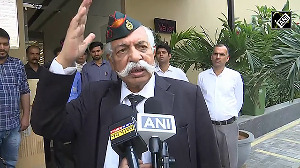This is the best social media advice you can ever get!
Illustration: Uttam Ghosh/Rediff.com

Expressing yourself on social media (including Facebook, Instagram, WhatsApp, LinkedIn, Twitter and blogs) has become the norm or rather a necessity.
For job seekers, social media is a platform which creates and builds your image based on what you 'feed' about yourself in terms of comments, pictures, followers, etc.
In India, for many years, recruiters would find ways to track employees on job portals like Naukri, Monster, Indeed, etc. and then initiate retention actions based on the date of their updated resumes.
With advancing technology, job seekers now can hide the status updates from current employers, but still some of the employers do find out.
Many organisations still consider any employee's presence or activity on professional networks like LinkedIn as an intent to change jobs.
Companies hire PR agents, who keep an eye on your social media behaviour including time spent, tweets about the institutions and authority, etc. Such posts reflect your work ethics and reliability -- two very important criteria for getting hired.
Prospective employers do scan your social media presence and activities to assess your personality too.
Your comments or quotes are assessed for the type of person you are and to judge your compatibility with the organisational culture.
It also reflects your state of mind and attitude -- simply put your approach towards life.
As quoted on Monster.com, a study by the Society For Human Resource Management (SHRM) found that 84 per cent of employers recruit via social media, and 43 per cent of employers screen job candidates through social networks and search engines.
The IVY EXEC post shares what turns off the recruiters.
Take a look at some of the biggest turn-offs:
- Illegal drug references - 83 per cent
- Sexual posts - 70 per cent
- Spelling/grammar - 66 per cent
- Profanity - 63 per cent
- Guns - 51 per cent
- Alcohol - 44 per cent
Here are a couple of things you may like to consider to improve your social media presence:
1. The friends you make on social media talk a lot about your image. Since you are responsible for self-branding, make and attempt to present a well-rounded image of yourself.
2. Even if you have a view which is not positive, present a comment based on facts rather than getting carried away with the crowd and blindly liking any post.
3. Remember that the image you create of yourself on social media, may at times disqualify you for a job, although you may technically meet all the job requirements.
4. Social media is about reaching out to people who can add value to you and your profile. That is not enough, you cannot make connections and hide in a corner, you need to interact, have meaningful discussions and interaction.
5. Part of too many groups and have absolutely no activity? While it may portray a wrong image that you just like to show off, it also reflects a lack of self-confidence or content.
6. Voice your opinions (original) and share thoughts. Your depth of knowledge is visible through your posts, especially if they are self-written and not just forwards or likes. There is no harm in sharing a forward, but always add your opinion and write why you like a post.
7. Most of the social media platforms allow you to represent a social cause. Pick a cause you can relate to and then volunteer or share.
8. Your number of followers do not matter, but the quality matters. Don't forget about the assortment of tools out there that allow employers to weed out fake followers. It's all too easy to get caught cheating, and that could certainly cost you the job.
9. Another cardinal rule is never write anything that may show your current or past employer in bad light. Remember, other employers hire you based on how you view your employers in the past.
Rob Holmes, CEO of IPCybercrime had one golden rule which might come handy. 'My rule of thumb is, basically, any behaviour your mother disapproved of should probably not be public,' he said.
The author Lakshmi Murthy is chief people officer, ITM Group Of Institutions, a vocational training and recruitment institution.







 © 2025
© 2025